Why Do Quakers Worship in Silence?
Quakers have a long tradition of worshipping in silence, but what really happens when the room gets quiet? In this episode of Thee Quaker Podcast we visit a silent Quaker Meeting for worship and find out for ourselves about this challenging, powerful, and ultimately freeing experience of trying to listen for the divine in a noisy world.
Subscribe so you don’t miss an episode!
Leave a comment below to share your stories and thoughts!
Discussion Questions
- Fritz Weiss distinguishes between the outward silence, which he calls the “ambience,” and the actual worship, which is an “internal, expectant waiting”. How did this distinction challenge or clarify your perception of what happens in silent worship?
- For Candi, one of the most practical takeaways was learning the value of “making the pause” in her daily life. What are some everyday, practical benefits that could come from practicing expectant waiting, even outside of a formal worship setting?
- The episode concludes that the experience of the Divine is an “inward calling that leads you outward” to co-create a better world. What do you believe is the relationship between internal spiritual practice and outward action for social change?
Zack Jackson
Hey it’s Zack, and before we start this episode, I wanted to jump on one last time to say both “Thank you” to everyone who has joined us during this supporter drive, and to let you know that we are extending it by just a few days to make sure that everyone has a chance to get their hands on this single-run Benjamin Lay mug that we’re giving away to everyone who gives at least $10 a month. You can check out quakerpodcast.com if you want to see what it will look like. We knew that setting a goal of 100 new supporters in a 7 week period was ambitious, and yet here we are with 79 new supporters. Some of you have even decided to increase your monthly giving! I am overwhelmed by your support, and so grateful for this community. So, if you’ve been on the fence about becoming a monthly supporter, we are extending our supporter drive until next Monday, October 6th at 9am. After that, we will place the order to print these Benjamin Lay mugs, and I will be in touch with you about when you can expect them. So if you would like to help us achieve our goal, AND receive your new favorite coffee mug, head over the Quakerpodcast.com and sign up in the top right corner. Thank you so much. And now, here’s the show.
Zack Jackson
If you go into Google and type, “why do Quakers ____”, two of the top auto complete results have to do with worshiping in silence. I know that not every Quaker community worships in silence, but historically, it’s been one of the defining features of Quakerism, and to outsiders, one of the most confusing. More than that, it can also be intimidating to someone who is new to Quakerism, and experiencing silent worship for the first time.
Before I sought out the wisdom of scholars and longtime Quakers on this topic, I wanted to experience silent worship with someone who didn’t think it was possible for them to worship in silence. So I enlisted the help of my dear friend Candi Haas-Simmons, and together, we set out on this spiritual experiment. Candi is a neurodivergent professional artist who knows a little bit about everything, and is infamous for turning our weekly prayer walks into bird watching sessions. So I could think of no one better to explore this question with than Candi.
Zack Jackson
I picked her up at 7:30 and as we drove the 45 minutes to Pendle Hill retreat center for morning worship, Candi explained why the thought of silent worship made her so uncomfortable.
Candi Haas-Simmons
What’s to keep you during that silence from just getting on the hamster wheel of thoughts and running and running and running and running until you accidentally shoot yourself off the side, because that’s what my hamsters used to do.
Zack Jackson
But as an artist, Candi’s experience with inward silence is more complex. She can enter a quiet meditative state, but only when her hands are busy.
Candi Haas-Simmons
It’s more like having to learn how to meditate where you’re supposed to be, emptying yourself rather than and sort of blank canvassing. Now this is a possibility I do exactly that thing, which is emptying, emptying, turning off the verbal centers of my brain when I paint. For me, it’s coming from the fact that I’m allowing my ego to step aside and someone else to take the wheel. So that emptying out sort of makes sense to me, but I also don’t know that I could do it in just sitting because my habit is to do it when I’m painting.
Zack Jackson
So that was our experiment. Could my artist friend who finds silence through action, find it by just sitting still? Would the communal experience of worship feel different than losing oneself in the solitary act of painting? We were about to find out…
GPS
There is a 30 minute slowdown ahead. You are still on the fastest route.
Zack Jackson
Well, we’ll be there…
Candi Haas-Simmons
after it’s over, right?
Zack Jackson
Because, why wouldn’t there be accidents on a Thursday morning. Yeah, yeah. Two accidents. Not one, but two, but two.
(sigh). We walked through the doors of the worship space with five minutes left. Though our hearts were heavy laden with anxiety and frustration, I felt my own spirit lighten as I walked into the space. It’s hard to explain, but the air feels different in a silent meeting for worship. It was as if the Spirit in the room reached in and took my anxiety off like an overcoat and hung it up outside the room. We found an empty bench and sat in that pregnant silence for five minutes before the meeting concluded.
That five minutes in worship left us wanting more, so we got back in the car, found a quiet place near the trees, and tried to enter back into that silent worship with just the two of us. We immediately noticed a difference.
Candi Haas-Simmons
There’s definitely something about that collective silence that makes a difference.
Zack Jackson
We both felt it. Despite our intentions being the same, collective worship just felt so much richer than when it was just the two of us. So we made a plan to come back the next week, to leave the house much earlier, and to enter into that collective worship in its fullness. Now that we had a taste of unprogrammed worship, Candi had questions. The most pressing question on her mind was…
Candi Haas-Simmons
I want an honest answer of whether they still find it hard, if there are times when they struggle to achieve what they want.
Zack Jackson
So I called up our executive producer Jon Watts for some advice.
Jon Watts
So do Quakers struggle with silent worship? Is that? Is that a challenging practice? Is it? Is it sometimes hard? I would say it is hard every time. There is no time where I don’t struggle. The goal with sitting in silence the first period of every Quaker Meeting for Worship, for me, is sitting with my thoughts that I’ve been avoiding for a whole week by distracting myself and keeping busy and doing other stuff. And so there’s a serious challenge there. Every single week, it’s like, you know, it’s like, going to the gym or something where, like, it’s not supposed to be easy. It’s not, it’s, it’s you’re, you’re always stretching yourself. And so it’s not, it’s not sitting down in silence that I’m like yearning for all week. It’s what happens on the other side of it, which is when you get centered down, when you have this experience of a gathered meeting, when you have this sacred, mystical experience of sitting in a room with a bunch of other people, all trying to get past that, you know, barrier of thoughts and distractions into this sacred space, it’s transformational.
Zack Jackson
Do you have any practical tips for I mean, listeners in general, but me in particular, because we’re gonna, we’re gonna go back in two days, and we’re gonna try again. We’re gonna leave a lot earlier, just in case. Well, so what would you suggest for somebody who is going to an unprogrammed meeting for worship, on how to prepare ahead of time, how to use the time?
Jon Watts
Yeah, I think my first piece of advice is just to be patient. Be patient with yourself. Be patient with the experience. You might come to Quaker Meeting for Worship expecting to have a deep, mystical experience, and then find that you’re just spending time going through your shopping list or something, and and then there’s a meta level of thinking where you get you get disappointed or mad at yourself or frustrated that you’re just thinking about your shopping list. And I want to talk to that meta level of yourself. Don’t just let just let that happen. Let your mind think about what your mind is going to think about, and don’t try and control it. At some point, if you’re patient, and if you’re not trying to clamp down on that, you’re going to move through it. It happens to me every meeting for worship. I start off thinking, like, really, is this what I came to Center City for and gave up half of my Sunday for just to sit here and, like, think about stuff and and the answer is, no, that’s not, that’s not what I came for. But it’s a, it’s a watch pot boiling a little bit if you are, are waiting for it to happen, if you’re just watching like, is it going to be mystical? Mystical now? Is it going to be transformative? Now. What about now? What about now? Why isn’t it mystical yet it’s not it’s not gonna happen like that. Just give it time. Just give it some time.
Zack Jackson
Okay, take two. With Jon’s advice fresh in our minds, we arrived on time, and entered into the simple and unadorned worship space. The room was quiet when we arrived, and there were a dozen or so Friends already present and engaged in silent, waiting worship. Some of them had their eyes closed, while others smiled kindly at us as we found our seats. The room felt almost… ionized. Like the air after a thunderstorm. There was a computer monitor mounted in the corner where 20 or 30 tiny faces appeared on a Zoom grid, joining in spirit despite being separate in body. Several people spoke into the silence with words that they felt compelled to share, and then we were finished. Candi and I walked back to the car to debrief…
Candi Haas-Simmons
I found it easier. I think it’s because I listened to what he had said about like silence and your own thought processes, and wasn’t as judgmental of myself when I was actually participating okay, Because I wasn’t. If I had an errant thought I wasn’t going, “Oh, you’re no good at this”. But I also had this random thought, and I thought, boy, I hope this isn’t God speaking, because I if it is, I understand what that person says about said about, if you’re quaking, it’s because you don’t want to listen to what God said, because when it the word showed up, I went, No, no, not me. Not good at that. Can’t do that. Oh, the words were lead them, and I’m like, No, who am I lead? I don’t want to leave anybody. Don’t wanna be point man, I don’t, you know, I’m not good at that kind of thing. That is like not playing to my strength
Zack Jackson
Candi heard a direct message, even if she didn’t want it. But for her, the biggest takeaway came down to a simple and practical skill that she could take with her out into the rest of her life as well.
Candi Haas-Simmons
And for me, like just learning to make the pause. I mean, I’ve got almost 71 years under my belt. And for a child that grew up autistic at a time when no one got autism learning, to make the pause is really, really hard. I mean, because I think, because I’m so tangled up in translating the pictures into words, and I’m so tangled up in getting a thought out before my brain hairs off and does something completely different. Makes it really, really that the pause for me would be like a vital skill to have. I don’t know that it’s gonna happen, but I’m gonna try it, you know. So we’ll see how I do.
Zack Jackson
Candi’s takeaway was personal and practical. For me, the experience was quieter. There was no voice, no vision. It was the simple, frustrating and ultimately freeing act of noticing my own hamster wheel and choosing not to get mad about it, just as Jon had advised me. And that led me to wonder, to wonder about the people who have been doing this practice for centuries.
The Early Quakers weren’t just looking for a moment of personal peace in the middle of a busy lifestyle. They were launching a radical movement. Silent worship was about something much bigger: equality, justice and a direct and unmediated connection to the divine. And I wondered if understanding that history might be the key to understanding the practice itself. So after the break, we’ll dig deeper into the radically egalitarian reasons why Quakers started worshiping in silence in the first place, and how that legacy is fueling acts of justice and transformation today. Also stick around to the end of the episode for a special reading from one of our listeners. We’ll be right back.
Zack Jackson
Every so often, we get to hear a story from a listener that reminds us why we make this show. A little while back, we spoke with AJ and Rihanna, two Friends from Berkeley, California. They told us about how they bonded over Thee Quaker Podcast at a really significant moment in their lives.
AJ Fox
We were on our honeymoon, driving around Northern California and Southern Oregon and spending a lot of time in the woods and in our car. And because we were in our car, we were listening to various things. And I said to Riana, “Hey, I found this new podcast that’s really, really interesting, and I think you would dig it.” And we just turned it on, and it became this kind of really great thing to listen to, it was a big, for me anyway, like a big part of what we were doing up there on our honeymoon was listening to this podcast together.
Zack Jackson
AJ and Riana had just been married under the care of their meeting. They were still full of the energy from that experience, talking a lot about their relationship to Quakerism and the joy that comes from a true sense of belonging.
Riana Fox
So it, I think it felt really like tender and sweet to like, be able to have this like media we could consume that like related to this kind of like, niche aspect of our life.
Zack Jackson
That’s what we aim to do. To explore and articulate the many different ways of being a Friend in the world today, and how those stories can unite us as a global community. But that work, this podcast, it only exists because of the support of listeners who value it. AJ and Rihanna decided to become supporters right there on their honeymoon.
AJ Fox
You know, I have a very vivid memory of becoming a monthly donor. I remember that we were in Arcata, and I think we were just about to roll out of town to our next destination, and Rihanna ran into a bagel place, and we were like, right in the middle of some, I think it was the board games episode, which we both really liked, and like, we had paused right on the kind of appeal for membership portion of that episode. And while Rihanna was in buying bagels, I was like, leaning on the car, looking at a bunch of redwood trees and thinking, you know, like this makes sense to me. This feels right. So I just did it on my smartphone in the five minutes that she was in the bathroom, and she came out and gave me some bagels, and I said, Hey, we’re members of Thee Quaker podcast.
Zack Jackson
If this podcast frames and articulates something important for you, if it helps you feel connected to the wider world of Friends, I hope you’ll consider following their example and becoming a monthly supporter.
You can help us to continue telling these stories by going to Quakerpodcast.com and clicking support in the top right corner. That’s quakerpodcast.com. And now. Back to the show
Zack Jackson
Before the break, Candi and I stumbled our way through an experiment in Quaker worship. Her biggest takeaway was learning the value of “making the pause”, as she puts it. For me, the experience left me with a question, what is this practice really for? I wondered if understanding the history might be key to understanding the practice itself. To find out, I spoke with Thomas Hamm, a retired history professor and lifelong Quaker. He explained that silent worship wasn’t just a stylistic choice, it was a radical attempt to get back to the roots of Christianity.
Thomas Hamm
Quakerism, of course, is a movement that rose in England in the 1640s and 1650s; the central figure in it was a relatively young man named George Fox. And Fox and other early friends felt that they were called by God to reinstitute the early Apostolic Church, and in their minds, that meant purging away all of the corruptions that had accumulated over 1600 years since the time of the early church. One of those corruptions was ritualism and ceremony.
Zack Jackson
So in an attempt to cast off the burdens and temptations of a religion that had gotten too intertwined with worldly power structures, the early Quakers stripped it all down and rebuilt their movement based on a few key principles. Perhaps the most central pillar of that early movement was the belief that
Thomas Hamm
all people have within them a certain portion of the Divine Light of Christ. If they are obedient to the leadings of that light, then it will lead them. Come to good lives acceptable to God, ultimately towards salvation. And of course, if all people in the world led good lives, then the world would be a good place. So the best way in the minds of Fox and early friends, to be attentive to the light, to put yourself in a position you were you where you were most likely to follow that light was to extract yourself from the diversions and vanities and distractions of the world, and the best way to do that was entering into quiet, into silence.
Zack Jackson
But from the very beginning, this ideal of pure, attentive silence often clashed with human nature.
Thomas Hamm
There’s also no question that many of the friends who gathered in meetings based on waiting silence from the 17th century into the 21st Century find it an ideal that is difficult to realize. The most common failings given by the exhortations you see against it was drowsiness, or friends simply falling asleep. And there’s a story told about the Friends Meeting in Spiceland, Indiana, near where I grew up, and supposedly in the 1870s an elderly male friend named driver Boone was one of those who was sitting on the facing benches, a position of honor at the head of the meeting. And apparently he dozed off and began to dream that the cows had got into his new corn field, and so he rose to his feet and sent his hat swirling to the back of the meetinghouse, saying, shoo cow, shoo cow.
Zack Jackson
So if the goal isn’t necessarily perfect quiet stillness, then what is it? I spoke about this with Fritz Weiss, a member of the Portland Friends Meeting. He told me that focusing on the outward silence misses the point entirely.
Fritz Weiss
The silence is just it describes the external, what it looks like people coming in, but the actual discipline of worship is more the internal, expectant waiting. So the silence is describing the ambience, if you would, but isn’t really describing the worship. To someone who was used to a church service with someone who was giving a sermon and leading songs looked to be silent, but in fact, during the worship, there were prayers and messages and sometimes songs, and that the it wasn’t, in fact, silent, that form of being still was a time and a discipline of listening deeply. And silent worship, in a sense, is an expectant dance of listening deeply to and stewing our own voice in our own busy mind, our own preoccupations, so that we can hear the universal that what is given to all of us and then, as is appropriate, or as we feel compelled to share that, what we discovered, so what, when we talk about silence, what we’re talking about is removing the minister from directing the service and allowing the gathered community to direct the service and allowing patience for what truth will arise at that time in the community to emerge.
Zack Jackson
As Fritz explained, I had it backwards. I was trying to create silence as a sort of container where I could put the Spirit, like digging a hole and waiting for it to fill with water. But he explained that silence is just what expectant waiting sounds like, and not to confuse form with function, because sometimes when the spirit moves, it’s not very quiet at all.
Fritz Weiss
And in a sense, Quakers are Pentecostal. That’s my opinion. You will find lots of Quakers who disagree with that statement profoundly. But we are gathered expecting to experience God directly.
Zack Jackson
Fritz isn’t referring to the modern Christian Pentecostal movement, but to a story from Acts chapter 2. Jesus had been crucified, resurrected, and ascended, but had instructed his followers to stay together and wait for the “advocate” to come to them. They likely believed that there was another leader who was coming to show them the way in Jesus’ place, but instead as they gathered and waited, each and every one of them experienced this mystical, unmediated inflowing of the Holy Spirit which inspired them to preach the Good News to everyone who would listen in whatever language they understood.
It wasn’t a group of priests standing up and speaking the authorized Word of God. It was men, women, young, old, educated, and illiterate alike who had sat in waiting worship and then been filled with a Spirit that shook them to their core. Pentecost is often called the birthday of the Church, and it was from that unmediated experience of the Divine that they went out to every corner of the empire and turned the world upside down. Early Quakers believed that they were experiencing another outpouring of the Spirit, and like the early church, the experience of the Divine wasn’t an end in and of itself, but a means to co creating a better world, an inward calling that leads you outward.
Jon Watts
So the times when I’ve been living in community where everyone is sort of listening to and faithful to and obedient to that voice, magical things started to happen, inexplicable things. So I do believe in a mystical call to obedience, like, if we’re if we’re listening deeply and we’re discerning well together. That’s another piece. Is that Quakers don’t just listen alone. We listen in groups, so we test like, I think I heard this, does that sound like it? Does it resonate with you? Are you? Are you hearing something similar? And we can test that with each other, but once we hear clearly, I think it’s really important to consider like, is that, is that what I’m called to do? Is that what I’m led to do? So it is, it is a conversation. It is a back and forth about the sort of the world we want to make and what we’re going to be a part of. But it starts with listening. If we can get there, if we can listen effectively to the leadings of the spirit, we’ve done something tremendous
Zack Jackson
Candi, and I set out to answer a question from the internet. And what we found was a deeply mystical, countercultural practice that was born from the radical notion that the Divine is accessible to all of us right where we are. Despite outward similarities, Quaker worship is not the same as mindfulness or meditation. It’s not about mastering your own thoughts or achieving enlightenment. It’s not a technique to be perfected or a state of mind to be achieved, but a posture of acceptance, rooted in the belief that the Divine is always present and somehow wants to communicate directly to and through us. It’s the grace to sit with our messy, distracted, beautiful human minds, not because we are doing anything special, but out of the pure joy and wonder of knowing that by waiting together, we are dipping our feet into the same stream of the Spirit that Peter did on Pentecost. It is a practice that doesn’t promise easy answers, but it does invite us to listen for the spirit in a noisy world and to have a little more grace for ourselves and others in the process.
Zack Jackson
Thank you for listening, and thank you to our guests, Candi Haas-Simmons, Jon Watts, Thomas Hamm and Fritz Weiss. For discussion questions and a transcript of today’s episode, make sure you check out Quakerpodcast.com and while you’re there, be sure to subscribe so you don’t miss a thing.
This episode was hosted, produced and edited by me, Zack Jackson, Jon Watts wrote and produced the music. Thee Quaker podcast is a part of Thee Quaker project. We are a non profit Quaker media organization dedicated to giving Quakerism a platform for the 21st Century. If you like what we’re up to, please consider becoming a monthly supporter, you can go to Quakerpodcast.com and click support in the top right window. It takes less than five minutes, and we really appreciate it.
For the past few weeks, we’ve been asking you, our listeners, for words of wisdom about what silent worship means to you. One friend, Mitchell Santine Gould left the following voicemail and read a passage from his book about Walt Whitman
Mitchel Santine Gould
The last friends took their seats. The doors were softly closed. Even the faintest whispers faded away as the assembly centered down, each alone with his or her own thoughts. Before the Lord, the hall settled into its own unique kind of Hush, an invisible field seemed to swell through the space. The concentric benches arranged around each wall seemed to be funneling the silence into the central void the way the ears whirls funnel faint sounds into the organ of hearing, but the void was no vacuum. Rather, it was seething with silent messages flickering into and out of existence, giving rise to a sense of wonder, which almost gave me goose bumps. We considered this profuse silence so spiritual that a perfectly wordless meeting was considered a triumph. However, we were gathered to wait for the Lord’s words to us, and usually, after a long quietude, someone would be moved by spirit to speak from the heart.
Hosted, produced, mixed, and mastered by Zack Jackson.
Original music and sound design by Jon Watts (Listen to more of Jon’s music here.)
This season’s cover art is by Todd Drake
Supported by listeners like you (thank you!!)
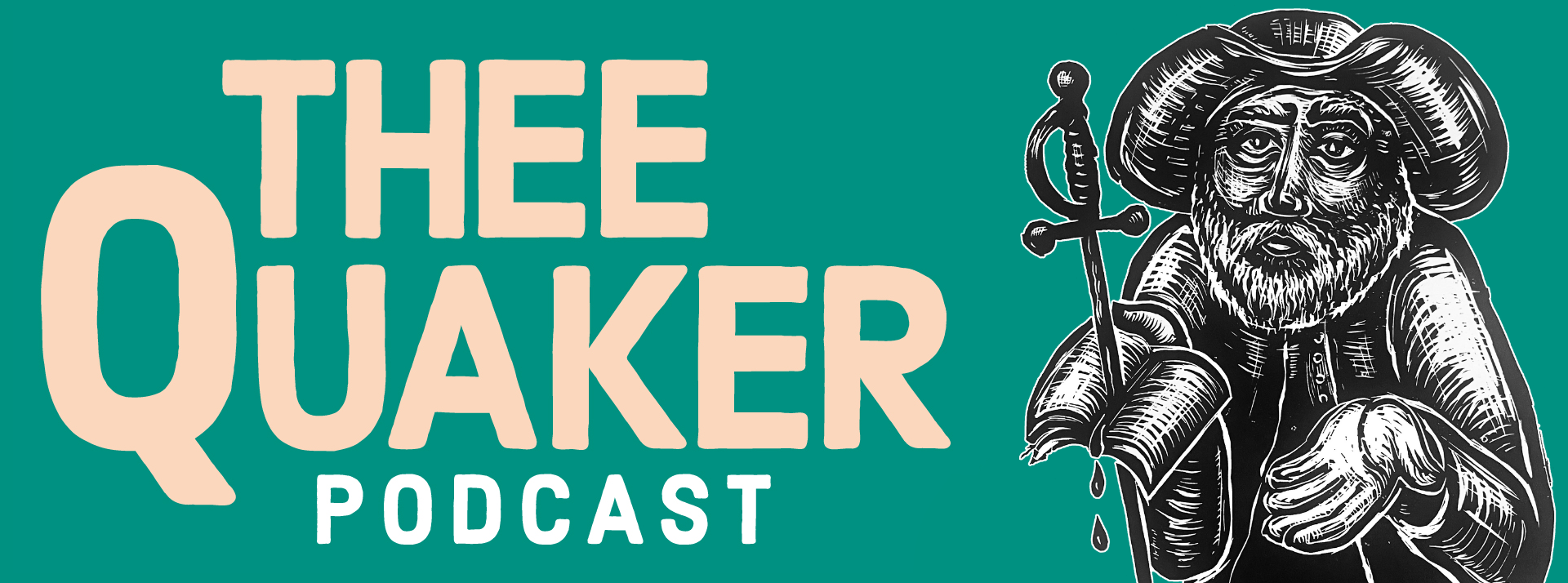

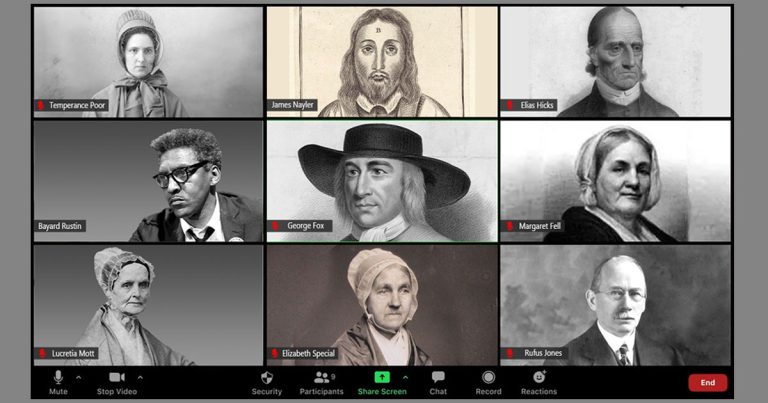
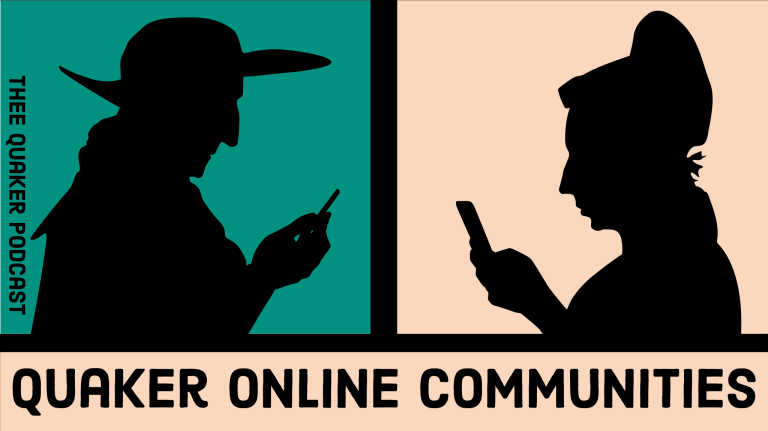
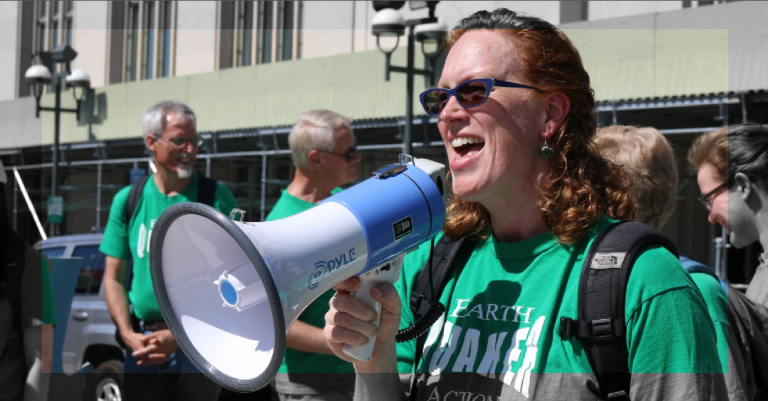
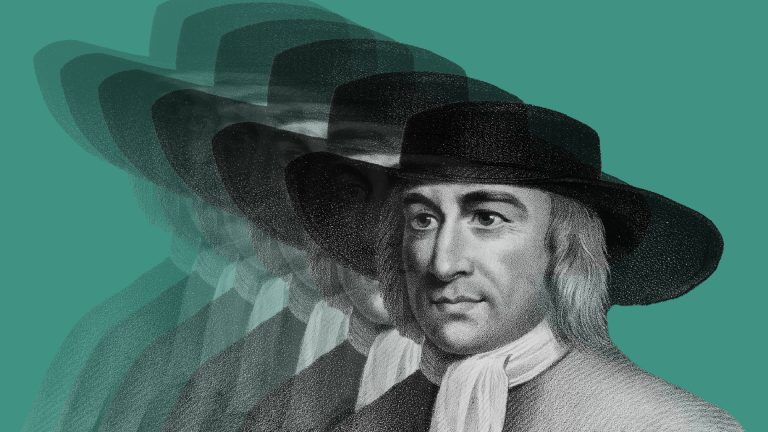
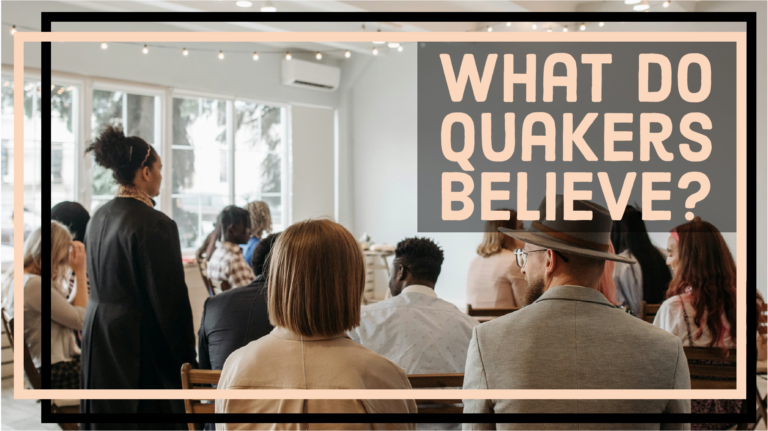

I am profoundly moved by reading your experiences. I have always wondered about Quakerism, and now am moved to seriously explore. I hope to find Friends near me. Thanks so much!
Thank you, Zack, Candi and Jon for this excellent episode on silent worship.
For many years, I have attended a fairly large meeting in Georgia that observes silent worship. I am continually amazed that folks there rarely talk about what they experience when in silence. That gives me the feeling that what they experience is real.